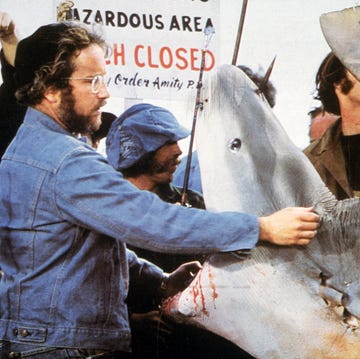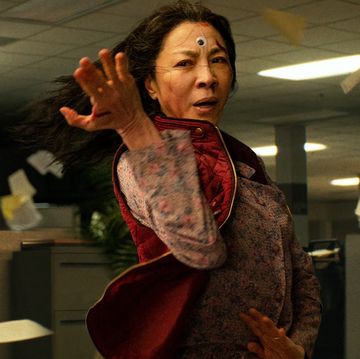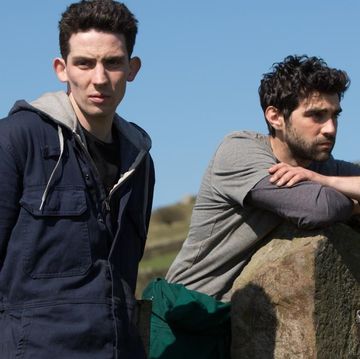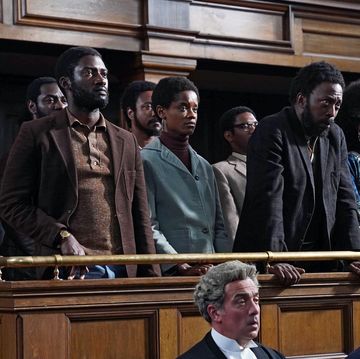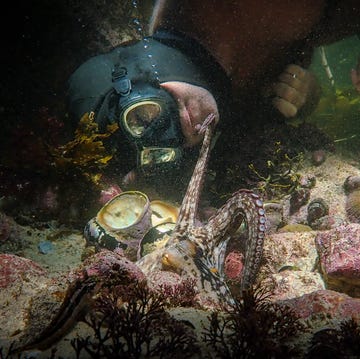Mia was the last to hear about the missing woman. After returning from the splintery outhouse where, despite snags and a sprung button, she had managed to change into ski pants, down jacket and wool beanie, she found the other Last Chancers standing in the meadow beside the tour bus. Some struck poses of concern, some of puzzlement, but most of them just looked impatient.
“Who is she?” Mia asked nobody in particular. The strangeness of her own voice — light, insubstantial, a scrap of polyethylene lifted by a breeze — led her to reflect that it was the first time she had spoken since they had departed the Elk Mountain Lodge at nine that morning. It was now three in the afternoon.
Her question hovered in the air for a moment before alighting on a woman with a heavy neck and small, alarmed eyes. “I don’t know,” she said, shaking her head briskly. “I don’t know anything.”
“Apparently,” said her neighbour, a tall, stiff presence in a turquoise parka, “she’s a brunette.”
A sudden gust yanked forward a stand of blue spruce and, as if changing its mind, released it. Mia pulled her zipper up to her chin.
“I never knew what brunette meant exactly,” said the first woman. “Is it just brown hair? Or must you also be young?”
“They say she is not very old and not very young.”
Most members of the group fit that description. Mia had chosen Last Chance’s tour of the shrinking snowpack of the Colorado Rocky Mountains because it was one of the cheapest vacations available, along with the dying Joshua trees of Joshua Tree and the melting glaciers of Glacier National Park, both of which had already sold out. The other packages were far more luxurious: Cairns, Manaus, Laamu Atoll. There were limits to what she’d spend in the name of vanishing beauty. And the prices would only go up. It was a group, she realised, self-selected for impatience.
The guide announced that there were 47 tour members but the interrogative plaint of his voice suggested that he had neglected that morning to perform an official count. If it weren’t for the two Nebraskan ladies who had raised an alarm, nobody would have even noticed the brunette’s disappearance. No one knew her name. The Last Chance Touring Company’s administrative aide kept passenger receipts at the office in Crested Butte, an hour back, but there had been no cell reception since Crested Butte. Mia scanned the broad valley for the fugitive.
“Is she in the commode?” someone asked.
“I was the last one out,” said Mia. She had only needed to change into warmer clothing and had allowed the others, all of whom seemed to have more pressing urges, to go ahead of her.
“Maybe she’s looking for Larry Barksdale.”
There were chuckles. Barksdale, the guide had explained into the amplifier on their winding, jittery climb to East River Valley, was the only permanent resident of the former mining town of Gothic. During summers, the town transformed itself into one of the world’s leading biological field stations. The cabins that ascended the hills were occupied by scientists who travelled from across the planet to conduct experiments on mayflies, white-crowned sparrows, bees, pollen, yellow toadflax and monument plants and pennycress, microbial parasites, fluvial dynamics, and the composition of the troposphere at 10,000 feet above sea level.
A conservation biologist had studied Gothic’s wildflowers for 48 summers, charting, pistil by pistil, the effects of an ever earlier spring. An ecologist, for 28 years running, had suspended heat lamps from electric cables over a plot of meadow to determine the consequences of a two-degree Celsius warming. An evolutionary biologist had recently taken over a 56-summer study of Gothic’s marmots. The scientists and their graduate students departed by Labour Day, when the cabins, offices, lab buildings and dining hall were boarded up. Only the caretaker remained. Barksdale had lived since 1974 in an A-frame cabin he had built just above the terminus of the dirt road. In October, before the first winter storms erased the road, he stockpiled enough provisions to survive until snowmelt.
Barksdale, the guide continued, had no advanced degrees himself; he had come to Gothic the summer before his senior year at Rutgers to do janitorial work for the biologists and never left. Yet he too was conducting a long-running experiment. There had not been a photographic or biological recording of a grizzly bear in Colorado since 1979, when a bow hunter killed a female and her cubs in the San Juan Mountains. Barksdale, however, claimed that a small sleuth of grizzlies haunted East River Valley. He had spotted them for the first time during the winter of 1984 and had observed them nearly every year since, tracking them through the valley. He had taken no photographs, documenting each encounter with detailed, even fulsome, handwritten notes. Barksdale was the only winter resident of East River Valley and the only person to have seen the bears.
Mia was envious of the brunette, wandering free into the mountains. And she was envious of Barksdale. Mia often fantasised about the powers granted by solitude. Not the isolation of a week-long sightseeing trip to Colorado among strangers, or the monastic life of a divorced anthropology PhD candidate living alone, without a car, in a studio apartment in Ithaca, but total solitude. What better paragon than Larry Barksdale, isolated for three quarters of every year, cloistered in the lap between two mountain ranges, a day’s hike from the closest member of his species? When the tour guide had checked Barksdale’s cabin, it was locked. A note written in pencil, taped to the door, said, “In the Wild”.
In the 15 minutes that it had taken for the group to use the outhouse and for the Nebraskan women to notify the guide, the brunette could not have gone far. East River Valley rose on either side of the dirt road in a series of gentle plateaus, the undulations like folds in a bed sheet covering a sleeping child. Dense groves of fir and golden aspen interrupted the foothills. Dirt paths that still bore the boot marks of Gothic’s summer residents meandered from the main road to the cabins. One of the paths terminated at the creek, resumed on the opposite bank, and disappeared into the nearest ledge of woods, where several more huts could be seen through the thinning branches. Might the woman have wandered into the woods? Had she retraced the dirt road, over the rise, back towards Crested Butte? Had she hiked into the hills?
Minutes passed. The brunette did not appear.
After a final anxious consultation with the bus driver, the guide, his jaw quivering, his mind no doubt searching for the relevant clause from the Last Chance Touring Company’s accident waiver, reached a decision. One hour had been budgeted for Gothic, after which they were to drive back to Crested Butte for a pizza dinner. The brunette would likely return soon but it wouldn’t hurt to search for her as widely as possible. While the few young children in the group remained behind with one of their parents and the bus driver, the rest of them would divide into groups of four and head in different directions. What better way to see Gothic?
Whether by gravitational pull, process of elimination, or pure chance, Mia found herself joined with a couple roughly her age. She had noticed them earlier, at the Pitkin Hatchery, when they had laughed wildly at a private joke during the cutthroat trout demonstration. Mia had not laughed like that since before she’d gotten engaged. To laugh like that you had to be freshly in love.
“Emily,” said the girl, with a broad smile.
“Josh.” The boy limply raised his palm.
“Mia.”
They started on a path of trampled arrowgrass that led from the road up a hillock.
“What does this woman look like anyway?” said Josh. “I wasn’t listening.”
“Brunette,” said Emily.
“I don’t think I ever saw her,” said Mia.
“I can’t blame her for trying to escape.” Josh turned to Mia. “Between the hatchery and the old silver mine I was ready to go full Barksdale.”
They were soon 50 feet above the valley floor. The other search parties scurried in every direction — into the forest, down the main road, along the creek — scaling the foothills on the opposite side of the valley.
“The only people who noticed her in the first place,” said Emily, as they approached the closest cabin, “were the two women from Nebraska. And they didn’t even talk with her. They just said she was spooky.”
“What, like a ghost?” said Josh.
The couple, Mia realised, were not really her age. They were younger, perhaps by five years or seven. To an older person they would seem to be peers. They weren’t. A person in their twenties was a child. It was not yet too late for Joshes and Emilies to begin again, get a new degree, change professions, move cities, or find new lovers, without negative long-term consequences. A 34-year-old, on the other hand, was an adult. But Mia had felt like an adult for many years now.
Emily stopped abruptly. “There are only three of us.”
“So?”
“The dude said groups of four.”
“When we find the woman,” said Josh, “we’ll be four.”
Emily shrugged. She pulled the cabin door. It was locked.
“I’m happy for the exercise,” said Josh. “Maybe we’ll see one of Barksdale’s bears.”
Mia remembered the old ladies from Nebraska. They sat across the aisle from her, chatting unceasingly about their husbands, who were fishing that day on the Gunnison River and no doubt sneaking cigarettes. The Nebraskans used the word “anymore” the way Mia might say “these days”: “He has too much time to himself since retiring, so he just walks about Cabela’s anymore.”
Suddenly, Mia laughed aloud. She had never thought of herself as a brunette.
“Don’t humour him,” said Emily. “You’ll just encourage him.”
“I rhyme,” said Josh, “all the time.”
Mia laughed again, a little too chaotically, and pulled her hat lower.
It was a nice feeling, this tramp in the mountains with two effervescent intelligent people; like attending a cosy little party. A search party. She hadn’t attended a real party for at least a year. She just avoided parties anymore. She was not about to ruin this one.
“Why would a person wander off into the wilderness?” asked Josh, suddenly very animated.
“Extreme curiosity,” said Emily. “Extreme confusion. Extreme desperation.”
“Extreme boredom,” said Mia. “Sometimes a person just can’t bear it any more.”
“I know the feeling,” said Emily.
“Larry Barksdale,” said Josh, “couldn’t bear it anymore.”
“Don’t encourage him,” warned Emily, but Mia smiled at Josh anyway.
Beyond the third cabin, the path curved around a boulder and entered a grove of golden aspen trees. The falling sun touched the brim of the cliff above them. The creek below was a messy signature in silver ink. The bus was the size of a beetle, the people standing beside it mites. Mia could not blame the group, or even the duo of Nebraskans, for missing her. She accepted that her appearance was not memorable. She had full lips and a strong gaze but her face was slightly too broad, her features flattened, her skin imperfect.
The most distinctive thing that could be said about her eyes was that they seemed, reflexively, to assume a mild squint. She was not young and not old, not pretty and not unattractive. She wore dark, muted colours. If she stood out in any regard, it was in the placidity of her manner which, depending on the observer, gave the impression of wisdom or harmless bafflement. No, she didn’t feel slighted by the confusion. She felt grateful. It was a gift, this realisation of her powers of invisibility, like discovering she could dunk a basketball, speak Mandarin, walk through walls.
“Should we turn around?” said Emily.
Josh checked his phone. “It’s been 20 minutes. It’ll be faster going down. So I’d say we have another five or 10.”
They entered the golden grove.
Emily turned to Mia. “You must be upset about everything that’s happening” — she gestured vaguely to the mountains, the trees, the atmosphere — “to take this trip. I mean we are, too, of course, especially if we decide to have children — ”
Josh gave her a look.
“You mean because I’m travelling alone?” asked Mia.
“No,” said Emily. “No —”
Josh interrupted. “She didn’t mean it that way.”
“I like having time to think,” said Emily. “To create my own schedule, to listen to myself. Mainly I like having time.”
The couple avoided eye contact.
“I just got out of a relationship.” Mia said it like a punchline. She knew better than to use the word “divorce”. It was only people in their forties, after all, who divorced. People in their thirties “got out of a relationship”.
“It’s none of my business,” said Emily. “But I had a feeling.”
“Em,” said Josh.
They paused beneath the aspen canopy. The sky between the branches glowed dull white. The air had passed from invigorating to cold. The damp earth beneath the shade of the grove smelled like cinnamon. Josh tried a lighter tone. “I wonder if Larry Barksdale ever — you know.”
“You mean, besides momma bear?”
“I don’t mean sex, necessarily. But why did he come out here in the first place?”
“Heartbreak?” said Mia.
Josh did not reply.
“Maybe this interests him more.” Mia gestured at the thrusting aspen trunks, the masses of chalky puffballs that burst from the moss at the feet of trees, the insects twirling in puddles of rainwater. A scratchy silence descended upon them.
“This is as far as we go,” said Emily at last.
The path dipped into a brook and did not resume on the opposite bank. The grass there was depressed in several places, perhaps by animals coming to drink at the water, but there was no obvious path beyond.
“It’s time anyway,” said Josh.
It was time. She had to tell them. It would spare the double embarrassment of their reaction when, returning to the bus, she would confess to the entire group.
“They’ve found her by now,” said Emily. “If not...”
Beyond the far bank rose a steep, densely forested hill. Something moved within the trees. It might have been the wind, which had sharpened as they climbed higher, or the fluttering of a bird. As Mia scrutinised the area where she had seen the movement, she detected another tremor in her vision’s periphery. It was too localised to be caused by wind, too violent to have been a squirrel or sparrow.
“I’m going to continue,” she said.
Josh and Emily passed signals between them.
“We can’t leave you here,” said Josh.
“What do you mean?”
“We don’t want to be responsible for a second missing woman.”
“I’m responsible for myself,” said Mia without affect.
Emily blinked as if someone had blown into her eyes. Mia knew what she was thinking: Please don’t let me end up like this woman. Emily reached for Josh’s hand.
“If I’m a couple of minutes late,” said Mia, “tell them not to worry.”
As she turned and hopped over the brook, she had a melancholy flash of déjà vu, but could not date the memory. She climbed to the top of the grassy bank. When she glanced back, the kids were gone.
She would have to be careful not to shock him. If Barksdale was stalking grizzly bears, wouldn’t he carry a rifle? Or was he like one of those zoologists who lived in the Virungas with mountain gorillas — grunting and signing, more at ease with the primates than in the company of human beings — and would consider the act of carrying a gun a betrayal of a solemn interspecies vow? She would need to make it clear immediately to Barksdale that she understood him. She had no desire to compromise his isolation. She requested just a few minutes. She only wanted a lesson from the master. A sentence. A word.
When she came over the next slope, a meadow orange with wilting wildflowers burst into view. It rose tentatively for several hundred feet before touching the forest of the moving shapes. The sky opened and the cliffs blushed in the falling light. Pockets of greyish snow, twinkling in the highest gulches, recalled the memory she had tried to suppress.
On the honeymoon, they had decided on a whim to get off the train at dawn in Krasnoyarsk; Chekhov, their guidebook informed them, had described it as a “picturesque, cultured town; compared with it, Tomsk is ‘a pig in a skull-cap’.” After the exhilaration of their sudden debarkation in an unknown city had worn off — in about the time it took to check their luggage at the ticket office — Max announced that he wanted to visit the Steamship Museum. It was a 19th-century steamboat, docked on the bank of the Yenisei River, that had carried Lenin to his exile 300 miles downriver. Mia wanted to visit the Stolby National Park, a short taxi ride south. They agreed to meet at the station in 13 hours, before the next train departed.
Mia passed an exuberant day in the taiga, bounding over spherical chocolate boulders and moseying through purple moss, followed by a solitary dinner of fish soup beneath a blue chandelier at the Bulgakov Bar. Max was 30 minutes late to the railway station, brandishing a canvas bag filled with books written in Cyrillic about Siberian folklore. They each saw that the other was happy, relaxed, revitalised by their time apart, and all that reflected happiness made them very sad.
At the far edge of the meadow, Mia hurdled a fallen fir, rushed through sticky clover that clung to her jeans, and entered the forest. The undergrowth was clean, almost manicured, carpeted with brown pine needles. She weaved between the trees, following the path of least resistance, heading uphill. There was no sign of Larry Barksdale. Who was she kidding? The hermit of Gothic would not be delighted to see her. The last thing he wanted was an apprentice, even one who (to follow her inchoate fantasy to its logical end) would move into a different cabin, across the creek, on the other side of the valley. If she were to join him in Gothic, neither of them would be alone. Yes, it was still possible to escape from the world. But was it possible for her to escape from the world?
The sky darkened and no matter what she did with her hat Mia could not get warm. Winter, at last, was coming to Colorado.
She had turned in the direction that she believed was down but the ground soon began to rise again. Batting at a pair of circling horseflies, she paused to drink from her water bottle, which had become alarmingly light, and tried to orient herself. The trees looked familiar but all firs looked identical to her. She could see no farther than 10 paces in any direction. A rodent scurried into a black hole in the ground. She was afraid to check her phone for the time. When a second woman went missing, would the tour guide figure out that the two missing women were one?
There came another scurrying sound behind her, louder this time; no rodent, no gust of wind. She froze, afraid to turn. She froze but she was no longer cold. She was burning.
“Mr Barksdale?”
The forest was still. A bird cried out, perhaps miles away.
“My name is Mia Stewart. I’m lost. I’m with the Last Chance Touring — ”
A low, inhuman growl interrupted her. She turned and found its source: a mound of fallen branches and dead fir needles. They covered the crevice formed by two dead trees that had fallen over each other. The growl began again, vibrating the structure, causing the fir needles to slide to the ground.
What were you supposed to do if you encountered a bear in the woods? You were not supposed to run, she seemed to recall, but stand tall, erect, and raise your arms above your head in a menacing pose. That seemed absurd. Were the rules different for grizzly bears? At Camp Pinewood in Maine they had only told her about black bears. Grizzlies were violent, aggressive. If the bear were lying beneath the mass of foliage, perhaps in a dazed state of semi-hibernation (had she awoken it from hibernation?), she would have the benefit of a head start. But she didn’t know which direction led back to Gothic.
The growl thickened into a huffing hyperventilation: huh-ha, huh-HA, huh-huh-HA!
She thought crazily: I found her!I found the brunette!
The mound of dead things erupted. Rising awkwardly beneath it, as if casting off a bulky quilt, came a brown furry head with stubby ears, a thick, black snout and small eyes set widely apart. Its lower fangs were a bright, plastic white. With one of its paws it swept the remaining branches from its body.
Mia raised her arms above her head. It was less a gesture of intimidation than placation or surrender.
The grunting gave way to a moaning anapaest: gr-gr-GREY, gr-gr-GREY! Then she understood.
“Go away!” yelled the bear. “Go away!”
She had an irrational desire to respond, to shout back she meant no harm, please let her escape and — if wasn’t too much to ask, could it tell her how to get back to Gothic?
The bear bellowed again, tilting its head backward in an unnatural pose, so that its nostrils, instead of its eyes, were fixed on Mia. She took a step forward. The bear did not move. She advanced another step. The bear retreated.
“Mr Barksdale,” said Mia.
The bear did not reply. Mia stepped closer.
The bear emitted a creaking noise that sounded less intimidating than mournful. As Mia nudged herself forward she could see that the fur was heavily worn and in some places ripped. The seam that connected the head to the body was exposed. The marble eyes were scratched. The holes in the nostrils were tattered mesh.
“I’m sorry to bother you,” said Mia. “A woman disappeared after we got to Gothic. Well, she didn’t actually disappear —”
The bear exhaled heavily.
“Would you be willing, please, to remove your mask?” said Mia.
“Why did you come here?”
She did not know how to answer.
“I watched you watching me,” he said.
Mia stared into the bear’s unmoving mouth, at the rubber gums. “I thought,” Mia continued, “you could teach me how to be alone.”
“Are they coming for me?”
“It’s just me.”
“Huh?”
“I’m alone.”
Mia and the bear examined each other.
“I was hoping,” she began, but she did not know how to finish. Blood beat furiously in her neck. A sharp gust brought water to her eyes. When she reopened them she saw with a start that he had moved closer.
“If you don’t go back,” he said, quieter now, “they’ll follow your tracks.”
Mia examined his glass eyes. They looked like something you might find in a cigar box at a flea market. She couldn’t tell if she wanted to giggle or scream.
“I take it there aren’t any grizzlies in these woods.”
“There might be,” said Barksdale. “I’m looking.”
They’ll find me, she thought. I’m looking. He did not want to be found but he was looking. She tried to balance this equation in her head and failed.
The bear stepped closer. Barksdale, or the bear suit, gave off a dense, fungal odour, an odour halfway between mud and death.
“Does it frighten you?” she asked. “To be alone?”
The bear extended his arm. The claw was disturbingly realistic. The nails were sharp.
“Go that way,” he said, and Mia realised he was pointing. “You’ll be at the road in 15 minutes.”
It took less than 10 minutes but she was spotted even sooner, once she emerged into the long, sloping, yellow meadow. Someone shouted and the mites by the creek pointed. When she reached the bottom of the valley she was overwhelmed by questions — confused questions, compassionate questions, hostile questions. It seemed every member of the Last Chance Touring Company group was shouting at her except for Emily and Josh, who stood apart, watching with suspicion.
On the ride back to Crested Butte, the bus was transformed. The Last Chancers were giddy with the excitement of the previous hour, an adventure far more thrilling than a glimpse of melting snow. They had pulled together in a great enterprise. They had found a missing person. Perhaps all was not lost after all! Still something about the experience scratched at them, left them unsettled. For the full hour the questions kept coming: “Were you scared to be alone?” “Did you see any bears?” “Why did you leave us?” “What was your plan, exactly?” “Were you scared to be alone?”
Like this article? Sign up to our newsletter to get more delivered straight to your inbox.
Need some positivity right now? Subscribe to Esquire now for a hit of style, fitness, culture and advice from the experts


